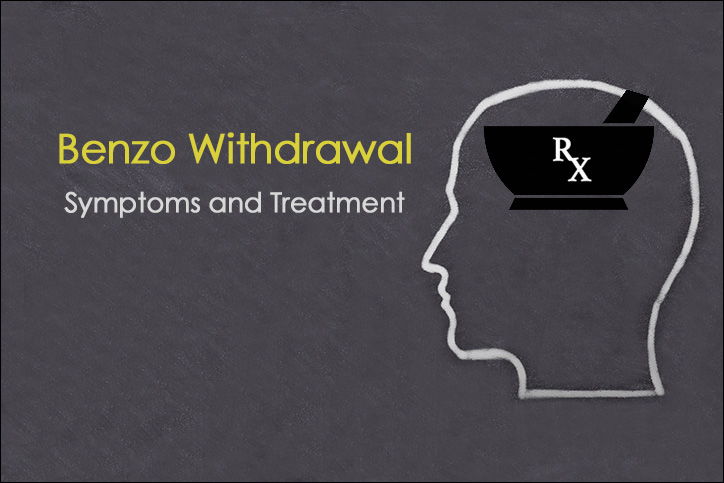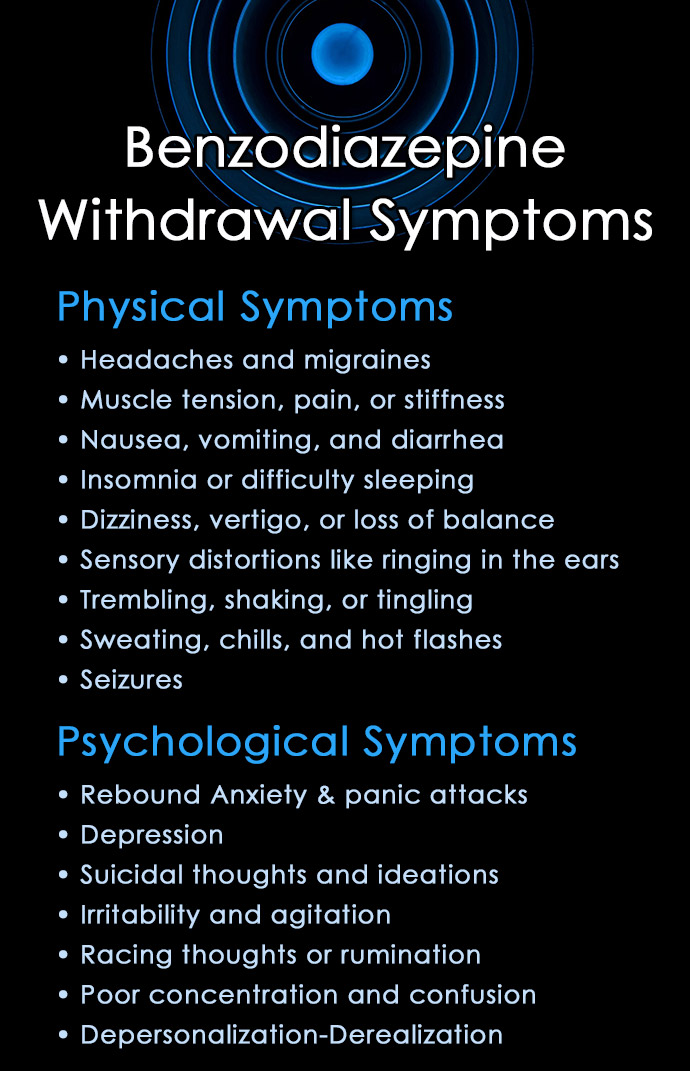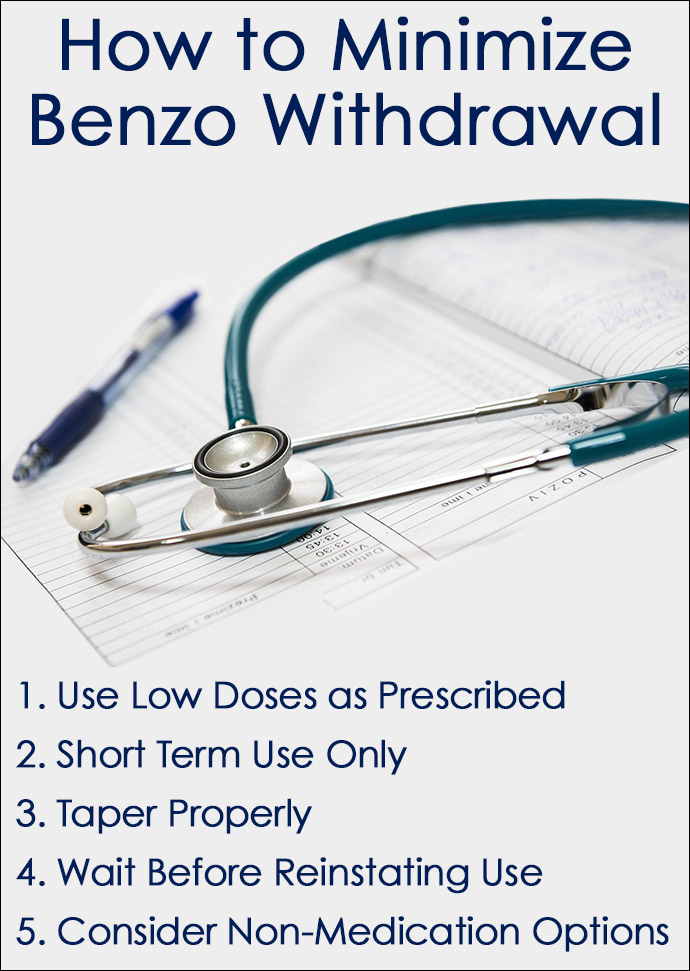Table of Contents
Benzo withdrawal symptoms from the use of drugs like Xanax or Valium can cause physical and psychological health problems. The severity and duration of benzodiazepine withdrawal depends on several factors.
When taken for a short period of time as directed by a doctor, this class of drugs can be effective for a variety of health issues.
Unfortunately, prolonged use or recreational misuse can cause a dependence and adverse effects. So, it’s important to understand the risks and how to identify the signs of benzo withdrawal and ways of treating the symptoms.
What is Benzodiazepine Withdrawal?
Benzodiazepine withdrawal refers to the symptoms that can occur when a person stops taking benzodiazepines after using them regularly.
Benzodiazepines, also known as benzos, are a class of central nervous system depressant drugs used to treat anxiety, insomnia, seizures, muscle spasms, and other conditions.
Common Benzodiazepines Include:
- Xanax (alprazolam)
- Valium (diazepam)
- Ativan (lorazepam)
- Klonopin (clonazepam)
When taken regularly over an extended period, the body and brain adapt to the effects of benzodiazepines.
Some types, like Xanax bars, are used recreationally in high doses and can be just as problematic as taking lower doses for a longer duration.
If the medication is then stopped abruptly, the body goes into withdrawal as it struggles to rebalance itself without the drug.
Both physical and psychological benzo withdrawal symptoms can emerge, which may be painful and difficult to cope with.
However, with proper medical treatment and support, the withdrawal phase will pass even if it takes longer than some people might expect.
Benzo Withdrawal Symptoms
Benzodiazepine withdrawal symptoms can produce a variety of physical and psychological issues.
Physical Symptoms of Benzodiazepine Withdrawal
- Headaches and migraines
- Muscle tension, pain, or stiffness
- Nausea, vomiting, and diarrhea
- Insomnia or difficulty sleeping
- Dizziness, vertigo, or loss of balance
- Sensory distortions like ringing in the ears
- Trembling, shaking, or tingling
- Sweating, chills, and hot flashes
- Seizures
Psychological Benzo Withdrawal Symptoms
- Rebound Anxiety and panic attacks
- Depression
- Suicidal thoughts and ideations
- Irritability and agitation
- Racing thoughts or rumination
- Poor concentration and confusion
- Depersonalization-Derealization Disorder
Because benzodiazepines are intended to reduce over-activity in the central nervous system, suddenly stopping the use of this class of drugs causes the brain and nervous system to become hyperactive, which produces a spike in benzo withdrawal symptoms.
Abruptly stopping the use of benzos can trigger anxiety symptoms to return such as a racing heart, panic attacks, or constant worry about minor issues. This is known as rebound anxiety.
Heart rate, blood pressure, and respiration may become elevated during some phases of withdrawal.
Seizures can also occur in severe benzodiazepine withdrawal cases, especially if a person already has a history of seizures. Anyone experiencing seizures during benzo withdrawal should seek emergency medical care.
What Causes Benzodiazepine Withdrawal Symptoms?
Benzo withdrawal symptoms are caused by the body developing a dependence on the effects of the medication over an extended period of regular use.
Benzodiazepines work by enhancing the neurotransmitter GABA in the brain. GABA acts as the brakes of the brain and nervous system. Increased GABA activity results in a calming effect for dealing with stress, anxiety, and sleeplessness.
After extended benzo use, the brain “downregulates” GABA receptors and adjusts its natural processes to compensate for the artificially elevated GABA activity induced by the drug.
The body can maintain a normal balance in the short term. But when the drugs are used for longer durations or abused, it can lead to physical dependence, tolerance, and withdrawal issues if benzodiazepine use stops suddenly.
Common Ativan side effects include increased anxiety and developing a tolerance that can lead to addiction.
When a person becomes dependent on benzodiazepines and stops taking them, the brain is left in a hyperactive state because it relies on the drug to function properly.
If this happens, neurotransmitter levels rebound in an opposite direction causing benzo withdrawal symptoms.
This is why it is crucial to not take benzodiazepine for too long or to use them in a way that is not directed by a doctor.
Appropriately resetting the brain changes caused by the drugs can take a considerable amount of time, which is why slowly tapering off benzodiazepines is required.
Benzo Withdrawal Phases
Benzodiazepine withdrawal tends to progress through three or four general phases. The time symptoms begin, and the duration depends on a range of factors.
1. Acute Withdrawal Phase
The early phase of withdrawal often begins within a few hours or days after the last dose is taken.
During this time, benzo withdrawal symptoms will start to become noticeable and may include anxiety, insomnia, muscle tension, and irritability.
Some symptoms come in waves and can intensify and subside before spiking again.
This is caused by the body’s release of different chemicals during the day and night as it attempts to stabilize itself.
Sudden acute benzodiazepine withdrawal can severely spike within the first few days or even weeks. Gradually tapering use of the drug can reduce the severity of the acute phase.
2. Subacute Withdrawal Phase
The symptoms of the initial peak may level off a bit as the brain’s chemistry stabilizes during the first or second week of benzodiazepine withdrawal.
However, many symptoms can persist through the subacute phase for a few weeks or even months. Symptoms can be erratic during this phase as things improve and regress.
Sleep disruptions, mood changes, and other issues maybe volatile as the brain and body continue to stabilize from the absence of the effects of benzodiazepines.
3. Post-Acute Withdrawal Phase (Protracted Withdrawal)
After several months, withdrawal symptoms gradually ease up further. Some issues may continue to surface on occasion for some time into the future.
When benzo withdrawal symptoms arise, they are usually not as intense as the early phases.
Completely rebalancing the brain’s neurological functioning without benzodiazepines can take up to 6 months to 2 years or more for some individuals.
Ongoing monitoring and treatment therapies help support the final phases of healing from benzodiazepine withdrawal.
Benzodiazepine Withdrawal Symptoms Duration
There are many variables related to withdraw, and each person will experience it in a different way.
The duration and severity of benzodiazepine withdrawal depends on several factors.
1. Length of Time Taking Benzodiazepines
Withdrawal tends to be more prolonged and intense the longer someone has been taking benzodiazepines. Using benzos daily for only 2 to 4 weeks may result in fewer potential withdrawal symptoms or none at all.
2. Dosage Amount
Individuals who regularly take higher doses of benzodiazepines for months or years will likely have more difficult withdrawal symptoms than those who use a lower dose.
3. Rate of Tapering Off Benzos
Suddenly quitting benzodiazepines makes withdrawal symptoms more severe compared to a gradual taper under medical supervision. A slow benzodiazepine taper over many months is recommended as the best way to manage withdrawal.
4. The Type of Benzodiazepine Used
The specific benzodiazepine used impacts both the potential severity of withdrawal symptoms and the length of the benzo withdrawal timeline.
Benzodiazepines with shorter half-lives like Xanax and Ativan clear the body more quickly. This often intensifies acute withdrawal in the first week as concentrations in the brain drop rapidly.
But shorter-acting benzos may have a slightly shorter overall withdrawal duration.
Drugs like Valium and Klonopin with longer half-lives taper more gradually. These may cause less severe initial withdrawal symptoms although they may prolong the duration of the post acute withdrawal syndrome timeline.
How to Minimize Benzo Withdrawal Symptoms
It’s possible to use benzodiazepines without experiencing severe withdrawal symptoms, but it requires following certain guidelines very carefully.
1. Use Low Doses as Prescribed
Only take the minimum effective dose required as prescribed by a doctor and never change the dose or frequency. This reduces the odds of developing a physical dependency.
2. Short Term Use Only
Long-term use of benzodiazepines over months or years has a higher withdrawal risk and is not recommended. Using them for certain situations for no more than 2 to 4 weeks is advised and will drastically lower the likelihood of withdrawal.
3. Taper Properly
If using benzodiazepines heavily for over a month, medical supervision should be used to slowly taper the dosage over weeks or months rather than abruptly stopping. Gradual tapers help prevent abnormal changes to the brain’s neurochemical balance.
4. Wait Before Reinstating Use
After completion of a tapering schedule, avoid using benzodiazepines again until the body has had time to re-stabilize, which might take several months.
5. Consider Non-Medication Options
Before using benzodiazepines, consider alternative sleep and anxiety management options like Cognitive Behavioral Therapy, meditation, yoga, exercise, and healthy sleep methods.
To avoid issues with addiction or benzo withdrawal symptoms, it’s best to take a conservative approach and only use them periodically when needed, and only under the guidance of a doctor.
Carefully follow the directions for use and instead of stopping all at once, gradually taper the dose and let the body reset completely before restarting usage.
Detox and Treatment for Benzodiazepine Withdrawal and Dependence
Seeking medical benzodiazepine withdrawal treatment early on can help ease symptoms and avoid serious health risks.
Medically Supervised Detox
Benzodiazepine detox involves gradual medical tapering of the dosage combined with therapies and medications to ease the intensity of withdrawal.
It begins with an assessment to determine the type, dosage, frequency, and duration of benzodiazepine use to create a customized tapering schedule to minimize symptoms. Long-acting benzodiazepines like Valium or Klonopin may be substituted and slowly reduced.
Relaxation techniques, vitamins, hydrotherapy, acupuncture, massage, or chiropractic care helps manage psychological and physical discomfort during the detox tapering stages.
Anxiety medication, anti-seizure, anti-nausea, and other non-benzo medications can be helpfully for treating some symptoms if necessary.
Low dose and low frequency users may require a shorter tapering schedule to avoid significant benzo withdrawal symptoms than those who have been using the drug in higher doses or for a longer duration.
After the acute detox phase has been completed, moving on to a formal treatment program is effective for recovery.
Benzodiazepine recovery may involve some of the following treatment approaches:
1. Medication and Non-Drug Therapies
Additional medications may ease certain protracted withdrawal symptoms during the recovery process.
Relaxation techniques, acupuncture, yoga, therapy and support groups can help manage some of the psychological and physical issues during recovery.
2. Psychotherapy
Processing the emotions, trauma, thought patterns, and underlying behaviors of benzodiazepine use can provide healthy coping strategies.
Cognitive Behavioral Therapy (CBT) teaches skills for emotional resiliency to prevent relapse and work through the long-term post-acute withdrawal symptoms. CBT techniques are widely used for addiction and mental health conditions because they have shown to be very effective.
3. Aftercare Planning
Benzodiazepine withdrawal should not be the end goal. Creating a tailored aftercare plan focused on lifestyle changes that foster long-term healing and growth in recovery without benzodiazepines is necessary. Building a strong foundation during recovery is helpful for relapse prevention.
Benzodiazepine withdrawal symptoms can be difficult and dangerous if not done properly with medical supervision.
Getting off benzos isn’t easy after heavy or prolonged use, but addiction and detox specialists will make the process safer and much more tolerable.





